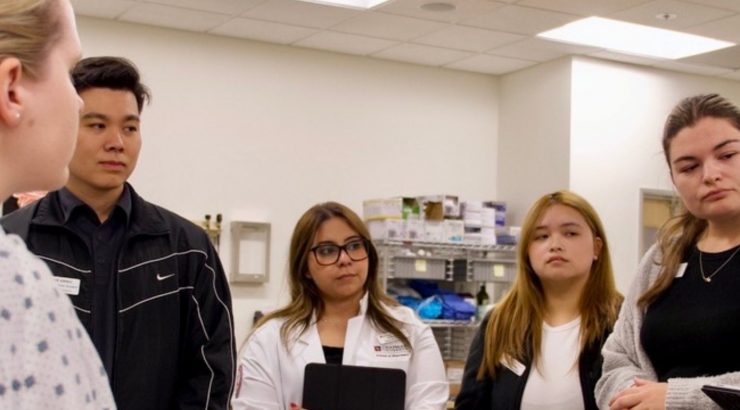Shaping Future Pharmacists through Interprofessional Education and Experiential Learning
September 30, 2024
At Chapman University, learning isn’t limited to students at their desks- More than a third of Doctor of Pharmacy learning occurs in simulations or in the field through experiential curriculum. Starting their first year, PharmD students take courses in Interprofessional Education (IPE), which trains students to care for patients in a team with other types of healthcare professionals such as physical therapists and physician assistants with Chapman University Crean College of Health and Behavioral Sciences. 
“The IPE courses and experiences shape our future practitioners to transform the delivery of health services, patient care, and health outcomes through teamwork and collaboration with other professions,” says Amanda Brown, RN, Director of Interprofessional Education at the School of Pharmacy. “While students may reluctantly participate in the IPE courses because of the evening schedules, the majority of students leave the sessions with smiles, a spirit of camaraderie with their new friends and future colleagues, and the understanding of the value of learning from and with students of other health profession programs.”
IPE courses, required by the Accreditation Council for Pharmacy Education (ACPE), ensure pharmacy students are exposed to a wide variety of skills and knowledge throughout their program while also giving institutions the flexibility to design these courses through a choice of activities. At Chapman University, these courses prepare PharmD, communication sciences and disorders, pharmacy, physician assistant, and physical therapy students to be collaborative, practice-ready professionals by playing active roles in interprofessional teams.
 Students have shared positive feedback about their IPE experiences. One student noted, “It was great to see more insight from other healthcare professionals and actually getting to work with them on a patient case. We have been sharing ideas through this series, so it was great to be able to put those ideas into practice.” Another remarked, “I learned that despite specializing in different aspects of the patient care process, each team member was able to contribute their knowledge to come to the same conclusion regarding the plan of care for the patient and the best way to propose and discuss this plan with the patient.”
Students have shared positive feedback about their IPE experiences. One student noted, “It was great to see more insight from other healthcare professionals and actually getting to work with them on a patient case. We have been sharing ideas through this series, so it was great to be able to put those ideas into practice.” Another remarked, “I learned that despite specializing in different aspects of the patient care process, each team member was able to contribute their knowledge to come to the same conclusion regarding the plan of care for the patient and the best way to propose and discuss this plan with the patient.”
During their first year, PharmD students complete the IPE 500-level courses, including IPE 501 in the fall, IPE 502 in the spring, and IPE 503 in the summer. The final course in this series, IPE 503, emphasizes all four IPEC Core Competencies and involves a role-playing simulation in which students collaborate with interprofessional teams to address an ethical dilemma. The simulation, conducted with actors portraying standardized patients, allows students to practice developing a person-centered care plan. As one student reflected, “This session really helped me understand and put into practice how different aspects of a healthcare team can work together.”
Each interprofessional team is assigned a faculty facilitator who helps guide the experience and debriefs on the interprofessional elements of the simulation. After completing the simulation, all student teams gather for a debrief on the bioethical aspects of the case. In recent years, students have had the unique opportunity to learn directly from the Bioethics Director from Kaiser Permanente Orange County and a Bioethics Committee member, gaining real-world insights from practicing healthcare experts.
On completing their first year, students reflect on the IPE experience through a survey. A vast majority—98%—of respondents recommend the course to future students, a testament to the value of these courses. As one student observed, “I can now approach my coursework with a broader perspective. I can think about how my information will be integral to caring for a patient along with other members of the healthcare profession.”
Through completing the IPE 500 course series, CUSP PharmD students form a strong foundation in interprofessional competencies, which they can build on throughout their remaining years in the program and eventually apply as licensed pharmacists. The emphasis on IPE aligns with the broader healthcare trend toward integrated, patient-centered care, where teamwork is essential for improved patient outcomes, especially in complex cases.


